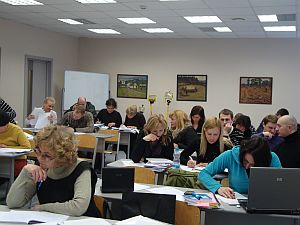Education and Science, Legislation, Lithuania
International Internet Magazine. Baltic States news & analytics
Thursday, 25.04.2024, 03:39
The first and second stages of admission to Lithuanian higher education institutions are over
 Print version
Print version |
|---|
The majority of young people continue choosing social sciences that lack prospects, while colleges admit even those with poorest marks. This year, almost 24,000 candidates have been invited to study at Lithuanian higher education institutions, among them 11,800 will study at universities while remaining 12,000 were admitted to colleges. Meanwhile, it is not clear how many young school graduates will leave for studies in foreign countries, reports LETA/ELTA, referring to Respublika.
The Ministry of Education and Science says that such data is not collected (maybe Minister Gintaras Steponavicius is not interested in how many students run away from his education reforms?...)
Aspirant students traditionally preferred social sciences (preference number one in 48,400 applications). Less popular were biomedical sciences (number one in 21,700 applications), technological sciences (18,200 applications), humanities (6,900 applications), arts (4,900 applications) and natural sciences (4,100 applications). Head of the Centre for Quality Assessment in Higher Education Pranas Ziliukas says that as many as 47% of all candidate students chose social sciences as their number one on the preference list. "The study programmes of economy, law and medical studies remained the most coveted," he said. He thinks that the preference of future students is influenced by their limited chances of being admitted rather than some fashion in studies. Only 6-8% of school graduates have state exams in chemistry and physics, while just over 4% of them choose IT exam. Therefore, according to Ziliukas, "Lithuanian school graduates simply do not have any other way but to choose social sciences".








 «The Baltic Course» Is Sold and Stays in Business!
«The Baltic Course» Is Sold and Stays in Business!

